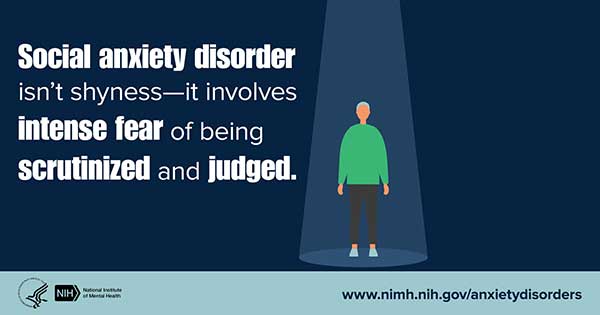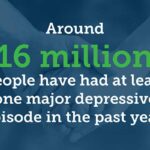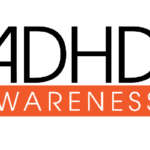
Social anxiety disorder affects approximately 15 million Americans, making it the second most commonly diagnosed anxiety disorder. It’s no surprise then that social anxiety is the subject of many highly relatable jokes, memes, and TikToks.
If you are concerned that you may have social anxiety disorder, it’s important to get an evaluation by a qualified mental health professional. They will be able to determine whether you meet the criteria for the diagnosis and provide you with appropriate treatment recommendations.
Due to its prevalence, social anxiety disorder (also called social phobia) is a popular topic on social media. Nearly 1.2 million posts on Instagram have the hashtag #socialanxiety and over 42,000 posts are tagged #socialanxietymemes.
The popularity of these conversations begs the question, is it really social anxiety disorder, or just your average shy, awkward moment?
It’s important to know what is in the range of the normal human experience, and what may indicate a more serious condition. There are a few key differences between shyness and social anxiety disorder that can help you understand more about this condition.
Shyness vs. Social Anxiety Disorder

“Social anxiety” has become a catch-all phrase in popular culture for any awkwardness, shyness, or stage fright. But these are all normal! Having occasional nervousness or shyness in unfamiliar environments or with new people is common and may not indicate social anxiety disorder.
Social anxiety disorder is more than shyness, but how can you tell the difference? According to the American Psychological Association (APA), shyness can present itself in many of the same ways: feeling nervous when talking to new people, sweating, feeling nauseous, and so on. But shyness is typically short term, lasting only until they feel comfortable around new people or in the new environment.
Social Anxiety Disorder Symptoms
Social anxiety, on the other hand, doesn’t improve with time, and can actually worsen over repeated encounters. Social anxiety can present as both physical and psychological symptoms.
Some of the physical symptoms of social anxiety present as:
- Blushing
- Nausea
- Excessive sweating
- Trembling or shaking
- Difficulty speaking
- Dizziness or lightheadedness
- Rapid heart rate
Psychological symptoms of social anxiety may feel like:
- Worrying intensely about social situations
- Worrying for days or weeks before an event
- Avoiding social situations or trying to blend into the background if you must attend
- Worrying about embarrassing yourself in a social situation
- Worrying that other people will notice you are stressed or nervous
- Missing school or work because of anxiety
Our Experienced Team of Psychiatrists Can Help!
We know that taking the first step can be difficult.
Our highly-trained psychiatrists and therapists offer a comprehensive and confidential approach to private, outpatient psychiatric care. Whether this is your first time seeking psychiatric care or if you are seeking a new provider, Novum Psychiatry can help. In-person and telehealth appointments available. We accept health insurance.
How Social Anxiety May Impact Your Life
Social Anxiety Disorder / Social Phobia can have a profound effect on your life. Constant worrying about social interactions often leads to avoiding the situations altogether. There are a number of situations that can trigger people with social anxiety such as job interviews, social events, parties, dates, public speaking, and even just the fear of a conversation in the grocery store.
People who suffer from social anxiety disorder may have trouble at work including fear about having conversations with bosses or clients, which can put their job at risk. They may be unable to apply for promotions or new opportunities for fear of needing to pass an interview.
Health and wellness may also suffer due to fear related to making phone calls to schedule appointments or speaking to a new doctor or nurse. This can be especially true if the health problems are personal or intimate.
Many people with social anxiety disorder may avoid social environments that would allow them to make friends or start intimate relationships. Social anxiety disorder is more than just feeling nervous in the situation; the anxiety starts at the mere thought of potentially needing to socialize or have a conversation. This preemptive anxiety is what makes social phobia so disruptive.
Social Anxiety Disorder Treatment
If you feel that your social anxiety is preventing you from living your life to the fullest, you should seek treatment from a qualified mental health professional.
Treatment often consists of talk therapy, medication, or a combination of the two. Cognitive Behavioral Therapy (CBT) is one form of talk therapy that has been widely studied and can help you manage your social anxiety and take back your life.
How Cognitive Behavioral Therapy Can Benefit People With Social Anxiety
Cognitive Behavioral Therapy helps people with social anxiety to identify specific thoughts, feelings, and triggers. Once those thoughts are successfully identified, you will learn how to reframe those thoughts and feelings into healthy, constructive inner dialogues.
At its most basic level, social anxiety involves a desire to be accepted, and therefore a fear of rejection or “making a fool” of oneself. This fear can then cause you to hyper-fixate on what could go wrong, or what the other person might be thinking.
As worry about judgment and rejection grows, physical symptoms of anxiety may appear, such as nausea, sweating, and stuttering. These symptoms of anxiety then cause more anxiety, more fear of judgment, and more negative thoughts. These thought patterns quickly become distorted and create a positive feedback loop. In other words, the anxiety quickly spirals out of control and reinforces the feelings that social situations should be avoided.
Cognitive Behavioral Therapy teaches you how to identify this “thought spiral” at its origin, so that you can redirect negative thoughts before you lose control of them. Your thoughts are not outside of your control, and your anxiety does not control you!
CBT is your guidebook for controlling social anxiety disorder and taking your life back.
Novum Psychiatry Can Help
Therapy and psychiatric support play a crucial role in identifying and overcoming social anxiety disorder (social phobia), panic attacks, and specific anxiety, and trauma. Novum Psychiatry has mental health providers who can help.
Novum Psychiatry serves Sudbury, Plainville, and surrounding communities. Our highly-trained psychiatrists and therapists offer a comprehensive and confidential approach to private, outpatient psychiatric care. Whether this is your first time seeking psychiatric care or if you are seeking a new provider, Novum Psychiatry can help.





